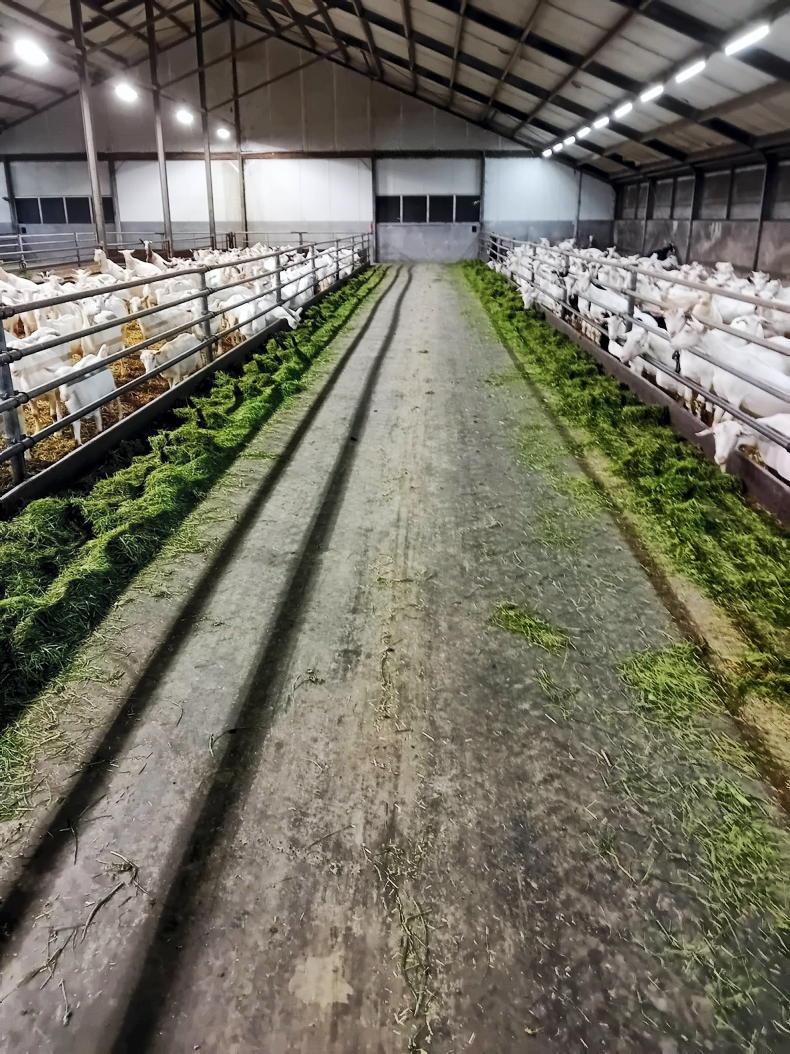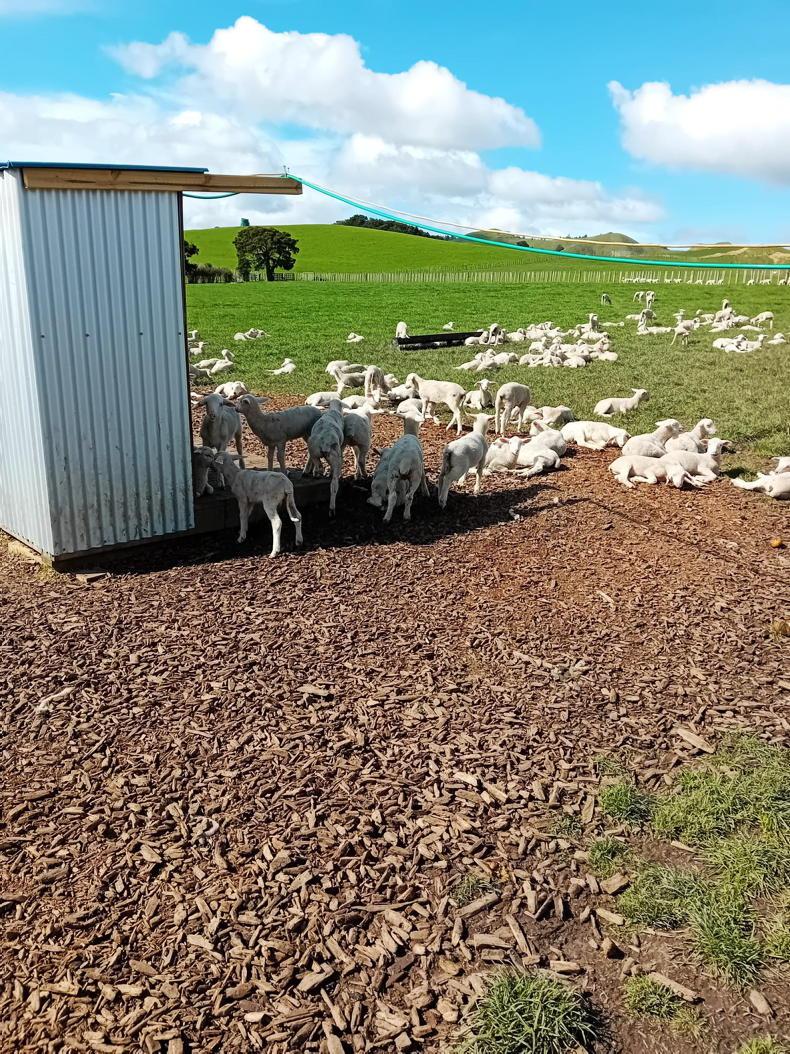Born and raised in Belfast, local vet Cormac White has undertaken a Nuffield Scholarship on the potential to develop a sustainable grazing-based small ruminant dairy system in NI.
Since graduating 10 years ago from University College Dublin (UCD), Cormac has spent two years in mixed veterinary practice in New Zealand and a further eight years in a farm-only practice in the south-west of England.
He has returned home and currently works with Jubilee Veterinary Practice in Newtownards while running his own sheep and goat consultancy business which operates throughout the UK and Ireland.
The aim of his study is to establish if grazing-based small ruminant dairying could alleviate some of the agricultural industry problems currently seen in NI.
A large proportion of farms in NI are classified as small holdings of less than 20.2 hectares (50 acres) making some unrealistic to milk cows.
Many of these holdings are currently sheep and beef enterprises with farm turnover not capable of providing high levels of income in the majority of cases with many individuals working full-time off farm.
Travel
Cormac got the opportunity to travel across the world to view sheep and goat units in China, New Zealand, Mongolia, Cyprus, Spain, France and Holland.
Most farms visited during his study tour across France and Italy were 12 to 16 hectares (30 to 40 acres), so similar in size to NI. The farms were milking in the region of 250-300 sheep or goats while generating enough income for one person.

An organic 1,000 goat unit in the Netherlands. The farm is zero grazing through Spring to Autumn and TMR feeding through Winter. \ Cormac White.
Cormac’s findings have shown the minimum viable unit is estimated to be in the region of 250-300 head generating a farm turnover of approximately £350 – £400,000, allowing significant investment in farm infrastructure.
Goat milk price is currently lowest in England at 68p per litre and across Europe prices from 75p to £1.10 are being achieved. Demand is exceptional with Italian buyers sourcing milk in Ireland at present.
Sheep milk across Europe is currently achieving higher prices between £1.60 and £3 per litre. Sheep milk solids is high, resulting in almost double the amount of cheese from one litre of sheep’s milk in comparison to cow or goat milk.
Cormac recently spoke at an event, pointing out that if the industry started to milk sheep and goats, we would undercut the market in a similar way we have with dairy cattle production.
He explained NI has a substantial advantage in that we can grow forage better than many other areas that are currently milking sheep and goats.
For example, in Cyprus they are only capable of growing forage for two months of the year while Spain only grows for one and a half months.
Spain is the second-largest goat milk producer in Europe but on average feed 1kg concentrate per 1kg milk produced per goat, which long term is not viable.
He explained these countries use enormous amounts of concentrate feeds which make them extremely vulnerable to feed price rises, especially Cyprus who import all their concentrate feeds.
Technically efficient countries and potential future competitors in France and Holland feed an average of 0.33kg concentrate per 1kg milk produced.
Yields
In well-managed units, high milk yields can be achieved, with intensive indoor systems having up to 600 to 800 litres of milk produced per lactation in dairy sheep and approximately 1,500 litres per year over a two-year lactation in dairy goats.
In a predominantly grass-based scenario, a 60kg dairy ewe has an expected production of 60 to 70 kg milk solids per lactation, with 100 to 120 kg of concentrates fed.
Feed
One benefit seen across countries was that a lot of unprocessed grain can be fed in these systems as sheep and goats can process whole barley and whole wheat.

An 800-ewe milking flock in New Zealand. Lambs are turned out at two weeks old to this paddock with an automatic feeder. The farm is supplying Maui Milk for whole milk powder for the Chinese Market. \ Cormac White.
There are opportunities to do this system on a low-cost basis. In relation to methods of feeding, France and Spain have conveyor-type feeders which significantly reduce labour requirements on farm and are quite cheap technology.
Cormac’s studies have shown that small ruminant dairy production in NI is doable but a 10-year road map needs to be put in place. It has the potential to rejuvenate and maintain rural communities across Ireland.
A key part of this is to create hubs of farms to supply single processors, while also having access to some government funding.
Findings from his travels to China showed their agricultural government funding was being spent right throughout the supply chain with 0% interest being provided to both farmers and processors for investments.
This has shown to generate a lot more investment throughout communities.
A consortium of specialists is being put together to apply for innovate UK funding to develop the genetics for northern European dairy sheep.
Genotyping in Britain within the dairy sheep flock is currently underway.
Sourcing genetics due to bluetongue is the main challenge going forward.
Initially a number of high-maternal genetic sheep breeds selected for milk solids production, sound feet, shedding ability and conformation will be used such as Lleyn, Belclare, EasyCare and Clun Forest.
High-dairy Lacaune semen will be sourced from OVI-TEST France and used to develop these breeds for our grazing climate.
The main issue Cormac referenced from a processing position is how to get milk produced to a scaleable volume in small regions to go through a processor.
Can we develop a similar processing scenario to Mongolia where they have created a number of smaller farmer-led co-ops?
In addition where is the Northern Irish end product going to go – in reality it will be very difficult to compete with Pecorino and Manchego cheeses from highly established brands.
However, markets for sheep milk and goats milk are growing, with demand on the rise in England.
In south east Asia there is a growing market for infant formula and in the Middle-East they have historically consumed a lot of sheep and goats milk, despite not producing enough locally.
Opportunities gained by a Nuffield journey
Speaking in relation to his experience of the scholarship Cormac said: “I think the key going into it is having a broad scope of the project and how it can impact people beyond the farm gate.
“It’s a great opportunity to take a step back from the day job and see its potential and possibilities.
“You make contacts around the world, you get to see other sectors within the agricultural industry, meeting some 120 fellow Nuffield scholars with some studying bananas to rice to wheat on large scale arable farms.”
Study
Cormac has become significantly involved in the area he has studied and has developed a knowledge-base that’s quite wide-ranging within the sector.
The Nuffield Scholarship has provided him the opportunity to become an expert in a topic that he originally had a passing interest in.
He delivers consultancy work with Future Farming Consultancy to small ruminant businesses of all sizes, providing services such as whole farm health planning, dietary formulation, business planning and sustainable produce sourcing.
“I’ve been asked to do consultancy work in China and all over the world — it really does open up doors in that regards,” he said.
“The experience has given me a lot of confidence coming into the agricultural industry.
“I sometimes feel like a fraud, coming from a non-farming background, but it reassures you that you aren’t and gives you the confidence to drive forward.”
Born and raised in Belfast, local vet Cormac White has undertaken a Nuffield Scholarship on the potential to develop a sustainable grazing-based small ruminant dairy system in NI.
Since graduating 10 years ago from University College Dublin (UCD), Cormac has spent two years in mixed veterinary practice in New Zealand and a further eight years in a farm-only practice in the south-west of England.
He has returned home and currently works with Jubilee Veterinary Practice in Newtownards while running his own sheep and goat consultancy business which operates throughout the UK and Ireland.
The aim of his study is to establish if grazing-based small ruminant dairying could alleviate some of the agricultural industry problems currently seen in NI.
A large proportion of farms in NI are classified as small holdings of less than 20.2 hectares (50 acres) making some unrealistic to milk cows.
Many of these holdings are currently sheep and beef enterprises with farm turnover not capable of providing high levels of income in the majority of cases with many individuals working full-time off farm.
Travel
Cormac got the opportunity to travel across the world to view sheep and goat units in China, New Zealand, Mongolia, Cyprus, Spain, France and Holland.
Most farms visited during his study tour across France and Italy were 12 to 16 hectares (30 to 40 acres), so similar in size to NI. The farms were milking in the region of 250-300 sheep or goats while generating enough income for one person.

An organic 1,000 goat unit in the Netherlands. The farm is zero grazing through Spring to Autumn and TMR feeding through Winter. \ Cormac White.
Cormac’s findings have shown the minimum viable unit is estimated to be in the region of 250-300 head generating a farm turnover of approximately £350 – £400,000, allowing significant investment in farm infrastructure.
Goat milk price is currently lowest in England at 68p per litre and across Europe prices from 75p to £1.10 are being achieved. Demand is exceptional with Italian buyers sourcing milk in Ireland at present.
Sheep milk across Europe is currently achieving higher prices between £1.60 and £3 per litre. Sheep milk solids is high, resulting in almost double the amount of cheese from one litre of sheep’s milk in comparison to cow or goat milk.
Cormac recently spoke at an event, pointing out that if the industry started to milk sheep and goats, we would undercut the market in a similar way we have with dairy cattle production.
He explained NI has a substantial advantage in that we can grow forage better than many other areas that are currently milking sheep and goats.
For example, in Cyprus they are only capable of growing forage for two months of the year while Spain only grows for one and a half months.
Spain is the second-largest goat milk producer in Europe but on average feed 1kg concentrate per 1kg milk produced per goat, which long term is not viable.
He explained these countries use enormous amounts of concentrate feeds which make them extremely vulnerable to feed price rises, especially Cyprus who import all their concentrate feeds.
Technically efficient countries and potential future competitors in France and Holland feed an average of 0.33kg concentrate per 1kg milk produced.
Yields
In well-managed units, high milk yields can be achieved, with intensive indoor systems having up to 600 to 800 litres of milk produced per lactation in dairy sheep and approximately 1,500 litres per year over a two-year lactation in dairy goats.
In a predominantly grass-based scenario, a 60kg dairy ewe has an expected production of 60 to 70 kg milk solids per lactation, with 100 to 120 kg of concentrates fed.
Feed
One benefit seen across countries was that a lot of unprocessed grain can be fed in these systems as sheep and goats can process whole barley and whole wheat.

An 800-ewe milking flock in New Zealand. Lambs are turned out at two weeks old to this paddock with an automatic feeder. The farm is supplying Maui Milk for whole milk powder for the Chinese Market. \ Cormac White.
There are opportunities to do this system on a low-cost basis. In relation to methods of feeding, France and Spain have conveyor-type feeders which significantly reduce labour requirements on farm and are quite cheap technology.
Cormac’s studies have shown that small ruminant dairy production in NI is doable but a 10-year road map needs to be put in place. It has the potential to rejuvenate and maintain rural communities across Ireland.
A key part of this is to create hubs of farms to supply single processors, while also having access to some government funding.
Findings from his travels to China showed their agricultural government funding was being spent right throughout the supply chain with 0% interest being provided to both farmers and processors for investments.
This has shown to generate a lot more investment throughout communities.
A consortium of specialists is being put together to apply for innovate UK funding to develop the genetics for northern European dairy sheep.
Genotyping in Britain within the dairy sheep flock is currently underway.
Sourcing genetics due to bluetongue is the main challenge going forward.
Initially a number of high-maternal genetic sheep breeds selected for milk solids production, sound feet, shedding ability and conformation will be used such as Lleyn, Belclare, EasyCare and Clun Forest.
High-dairy Lacaune semen will be sourced from OVI-TEST France and used to develop these breeds for our grazing climate.
The main issue Cormac referenced from a processing position is how to get milk produced to a scaleable volume in small regions to go through a processor.
Can we develop a similar processing scenario to Mongolia where they have created a number of smaller farmer-led co-ops?
In addition where is the Northern Irish end product going to go – in reality it will be very difficult to compete with Pecorino and Manchego cheeses from highly established brands.
However, markets for sheep milk and goats milk are growing, with demand on the rise in England.
In south east Asia there is a growing market for infant formula and in the Middle-East they have historically consumed a lot of sheep and goats milk, despite not producing enough locally.
Opportunities gained by a Nuffield journey
Speaking in relation to his experience of the scholarship Cormac said: “I think the key going into it is having a broad scope of the project and how it can impact people beyond the farm gate.
“It’s a great opportunity to take a step back from the day job and see its potential and possibilities.
“You make contacts around the world, you get to see other sectors within the agricultural industry, meeting some 120 fellow Nuffield scholars with some studying bananas to rice to wheat on large scale arable farms.”
Study
Cormac has become significantly involved in the area he has studied and has developed a knowledge-base that’s quite wide-ranging within the sector.
The Nuffield Scholarship has provided him the opportunity to become an expert in a topic that he originally had a passing interest in.
He delivers consultancy work with Future Farming Consultancy to small ruminant businesses of all sizes, providing services such as whole farm health planning, dietary formulation, business planning and sustainable produce sourcing.
“I’ve been asked to do consultancy work in China and all over the world — it really does open up doors in that regards,” he said.
“The experience has given me a lot of confidence coming into the agricultural industry.
“I sometimes feel like a fraud, coming from a non-farming background, but it reassures you that you aren’t and gives you the confidence to drive forward.”








 This is a subscriber-only article
This is a subscriber-only article










SHARING OPTIONS: